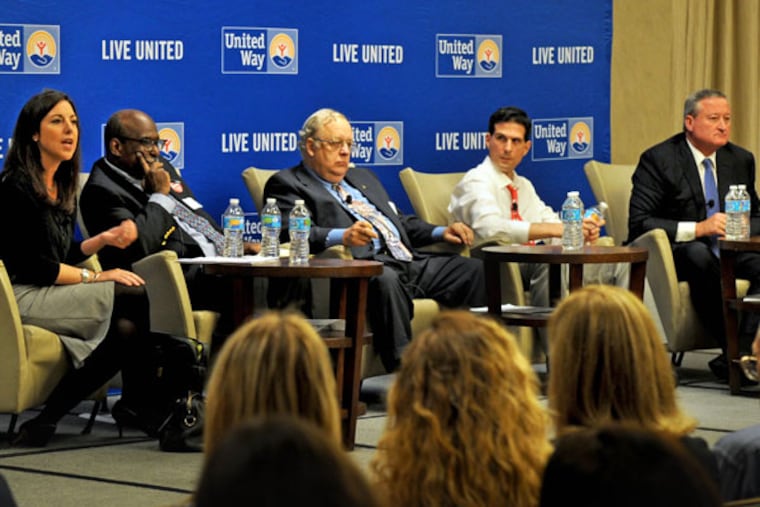Mayoral candidates hold first fall debate
The five candidates for mayor of Philadelphia spent more than an hour Tuesday evening discussing their plans for public schools and job creation, addressing poverty and blight, and talking about how they would negotiate with City Council.

The five candidates for mayor of Philadelphia spent more than an hour Tuesday evening discussing their plans for public schools and job creation, addressing poverty and blight, and talking about how they would negotiate with City Council.
The candidates did not engage with each other in the first debate of the fall campaign season. But Melissa Murray Bailey, a newcomer to politics as the Republican nominee, tried at the very end to use former City Councilman Jim Kenney's experience against the Democratic nominee.
"The definition of insanity is doing the same thing over and over again and expecting different results," Bailey said. "Why would we give someone who has had 23 years to make a dent on these issues another chance?"
Kenney, a politician with a newfound sense of restraint, ignored the last-minute gibe about his time on Council and stayed on script, speaking about how he would work as mayor to improve the lives of all Philadelphians. He said the lessons he learned on Council about building relationships would serve him well.
"If you can't get nine votes, you're going to spin your wheels forever," Kenney said of the majority needed to pass a bill in the 17-member Council.
Kenney and Bailey were joined in the debate by independent candidates Jim Foster and Boris Kindij, along with Osborne Hart of the Socialist Workers Party.
Foster spent much of the debate decrying what he called the city's "one-party" political system of Democratic control, and suggesting that institutions like the Philadelphia School District and Council need to be scaled back in size and cost.
"The city can't pay the bills," Foster said. "It's always short of cash. It's time to take a realistic look at what it takes to run this city."
Kindij repeatedly stressed his desire to raise the minimum wage in the city to $15 per hour; he said he would raise business taxes on companies that did not comply.
Hart called for city residents to mobilize and demonstrate for the redistribution of wealth, calling the Democratic and Republican Parties "beholden" to the wealthy.
Kenney resigned from Council in January and prevailed in May's six-candidate Democratic primary election with 56 percent of the vote.
He is heavily favored to win the Nov. 3 general election, due in large part to the city's hefty Democratic voter registration advantage. Of 998,340 city voters, 78 percent are Democrats, 11 percent are Republicans, and 11 percent are independents or belong to smaller political parties.
Bailey is an executive for Universum, a consulting firm that helps companies brand themselves to be more attractive to employees. She grew up in South Jersey and moved to Philadelphia three years ago. Bailey joined the Republican Party in January and was unopposed in the May primary election.
Foster publishes the Independent Voice, a community newspaper in Northwest Philadelphia. He ran unsuccessfully for Council in 2007 and for the U.S. House in 2011.
Hart, a merchandise stocker at Walmart, ran unsuccessfully for Council in 2007.
Kindij, also a newcomer to politics, works in real estate as a property manager.
Tuesday's debate was the only one scheduled to include Foster, Hart, and Kindij. Kenney and Bailey have three more debates scheduled. The final debate will be recorded by 6ABC on Oct. 23 and shown on television on Oct. 25.
215-854-5973
@ByChrisBrennan